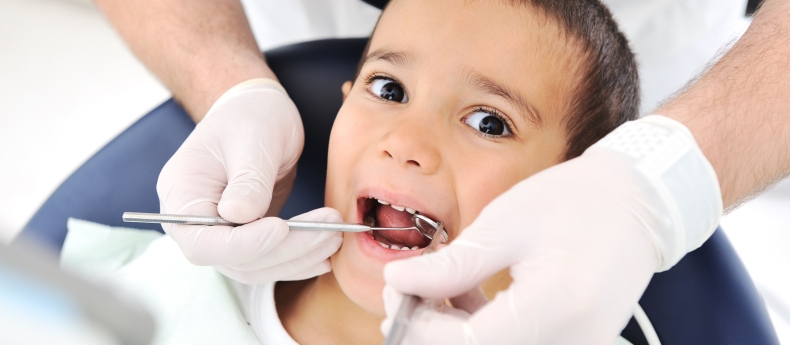
Healthy Habits for Healthy Teeth
Good oral health, including healthy teeth and gums, is an important part of your child’s general health and well-being.
Pediatric dentists go through an additional two to three years of rigorous training to be able to handle the oral health needs of infants, children, and adolescents, including those with special needs. At United Family Healthcare we are concerned about your child’s total healthcare, and good oral health is an important part of this. Our goal is to assist children with achieving proper oral health, help them feel good about visiting the dentist, and teach them how to take care of their teeth.
Baby teeth play a very important role in your child’s dental health and should be looked after. Children with healthy baby teeth chew more easily, gaining more nutrients from the food they eat. Baby teeth also help children to speak more clearly, and they preserve space in the jaw for adult teeth. If a baby tooth is removed ahead of its natural time, the space for the underlying adult tooth is lost. This can also lead to dental and orthodontic problems, especially overcrowding, later in life.
Preventing tooth decay
Decay can not only cause cavities, but can lead to infection and swelling of the mouth and face. Studies have shown that children with decay have decreased school performance, poor social relationships, and less success later in life. Early visits to the dentist can help avoid unnecessary cavities and dental treatment. Tooth cleaning, polishing, and fluoride treatment every six month are all part of preventive program to avoid dental problems.
Infants and children
Your child’s first visit to the dentist should occur shortly after the first tooth eruption and no later than his/her first birthday. During the first visit to our pediatric dentist we will:
- Perform a dental check
- Teach caregiver and kids (depending on age) about home care including brushing, flossing, diet, and importance of fluoride
- Talk about teething
- Check for oral habits like finger, thumb, or pacifier sucking
- What you need to know about preventing injuries to the mouth and teeth
- Information on growth and development
Adolescents
Appearance and self-image are very important to teens. Frequent snacking and hormonal changes may lead to decay or gum problems in teen years. Poorly positioned teeth or jaws might make them self-conscious. We provide a sensitive and caring approach to teenager’s complete oral health. When needed, we will provide information on sealants, orthodontic treatment, wisdom teeth, missing teeth, and tobacco use. If needed, the dentist can help create a mouth guard to protect teeth during sports.
The American Academy of Pediatric Dentistry recommends that children get a dental checkup at least twice a year. Regular checkups also allow pediatric dentists to provide an ongoing assessment of your child’s oral health, which allows for dental problems to be found and treated early.
At each visit, a pediatric dentist will review your child’s medical and dental history, examine your child’s teeth and gums, clean and polish the teeth, and apply a fluoride solution. The dentist will not only speak to parents, but also to the children using words and pictures that they will understand to motivate them to take responsibility for their oral health.
What are sealants?
Sealants are a clear protective material that is placed on the back teeth (molars) to protect them from cavities. Molars have grooves and pits on them that cannot be easily cleaned with a toothbrush. Even if your child brushes and flosses regularly, it is often difficult to keep these grooves and pits clean. The sealant covers these grooves and pits so that food does not get caught in them, thus reducing the risk of decay. Each child’s situation is different, but the most common teeth that are sealed are the six- and twelve-year molars, which are sets of back teeth that tend to come in around six and twelve years of age.
Make sure your child stays cavity free
- Visit the dentist on a regular basis
- Avoid frequent snacking
- Brush teeth twice a day.
- Floss teeth once a day
- Have sealant applied when appropriate
- Make sure your child gets proper fluoride either from drinking water, fluoride products, or fluoride supplements
Resources:
American Academy of Pediatric Dentistry (AAPD): http://www.aapd.org
Copyright United Family Healthcare 2018 All right reserved ICP 京ICP备13017554号-4



